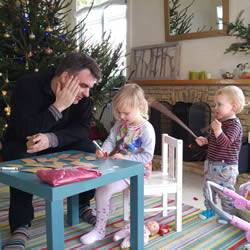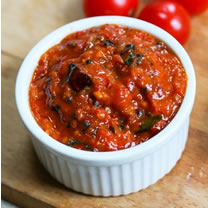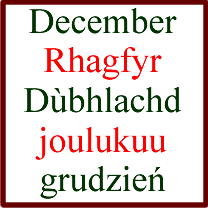
Here are some recordings of New Year greetings in various languages.
Do you know which languages they are?
Happy New Year / Blwyddyn Newydd Dda / bonne année / Bliain úr faoi shéan is faoi mhaise daoibh / 新年快樂!

Here are some recordings of New Year greetings in various languages.
Do you know which languages they are?
Happy New Year / Blwyddyn Newydd Dda / bonne année / Bliain úr faoi shéan is faoi mhaise daoibh / 新年快樂!

An interesting Swedish I learnt recently is snigelhus, which means shell, or literally “snail house”. Snigel is a snail or slug, and hus is house, case or residence.
The word snigel comes from the Old Norse snigill (snail), from the Proto-Germanic *snagila (snail), from the Proto-Indo-European *sneg- (to crawl, creep; creeping thing), which is also the root of the English words snail and snake.
Some related words include:
Another name for snail is snigel med skal (snail with shell), and another name for slug is snigel utan skal (snail without shell).
So it seems that skal is another word for shell. It also means coat, paring, rind, jacket or peel. A snail’s shell is not snigels snigelhus but snigelskal.
Other Swedish words for shell include:
Sources: bab.la, Wiktionary, Online Etymology Dictionary, and Linguee

I spent the past few days with my sister and her family. Her son is just over 2 and a half years old and is speaking a lot more than the last time I saw him at Easter this year.
He has trouble pronouncing certain sounds, such as r and consonant clusters like st, but at long as you listen carefully, you can usually work out what he’s saying.
He also invents new words, or gives words new meanings. For example, he has several toy monkeys (see below), and calls one ‘monkey’ or ‘daddy monkey’, another ‘other monkey’ or ‘mummy monkey’, and a smaller one he calls monkeykey, which I thought was very cute. He also calls playing cards, dominoes and other parts of games current buns. I’m not sure why.
Up-date: it turns out that I misheard the name of the monkey – it’s actually Monkey Keith not monkeykey.

I spent Christmas at my brother’s house and had a nice time. It was interesting to see how the language skills of my niece (4) and my nephew (1) are developing.
My niece speaks a lot, mainly in English, and sometimes in Russian (her mum is Russian), and is learning to read and write in English. She can recognise the letters, and with help can read and write words. When she writes some letters are back-to-front or otherwise not quite right. She hasn’t started learning to read and write Russian yet, I don’t think.
My nephew is at the one-word stage. He can say quite a few individual words in English, and sometimes puts them together into short sentences. He also understands Russian, but I haven’t heard say any words in Russian.

Here are some recordings of Christmas greetings in various languages.
Do you know which languages they are?

When looking for the French word for chutney last night we discovered the word aigre (sour), and realised that vinegar, or vinaigre in French, must be wine (vin) that is sour (aigre). This is indeed the origin of vinegar and vinaigre.
Vin (wine) comes from the Latin vīnum (wine, grapes, grapevine), from Proto-Italic *wīnom (wine), from Proto-Indo-European *wóyh₁nom (wine).
Aigre (sour, sharp, acid, shrill) comes from the Old French, from Vulgar Latin *acrus / *acrum, from the Classical Latin acer / acrem (sharp, sour, bitter), from Proto-Italic *akris (sharp, sour), from Proto-Indo-European *h₂ḱrós (sharp).
Chutney is a sauce made from fruit and/or vegetables preserved with vinegar and sugar. The word comes from the Hindi चटनी (catnī / chatnee – to lick). In French it is chutney, épice or salade piquante, and is defined as “condiment aigre-doux” (bittersweet condiment), which is where I found the word aigre.
Recently I learnt the Swedish word genomsnitt [jèːnɔmˌsnɪt], which means average or approximately. I thought I’d write about it as I like the way it sounds.
It comes genom (though, across) and snitt (a cut, an average). Genom comes from the Old Norse gegn (through), and snitt comes from the Proto-Germanic *snit (cutting, pruning, harversting).
Genom also appears in other words, including:
Genom also means genome.
Snitt also means dainty sandwich, fashion, incision, cut, section.
Related words, and other words containing snitt include:
Sources: bab.la, Wiktionary

Here’s a recording in a mystery language.
Can you identify the language, and do you know where it’s spoken?

In many languages this month is known as December, or something similar, which comes ultimately from the Latin *decumo-mēnsris (of the tenth month) – the Roman calendar started in March (mārtius) [source].
However in some languages December has a completely different name:
In Welsh December is Rhagfyr [ˈr̥aɡvɨ̞r], which means the ‘foreshortening’, from rhagfyrhau (to foreshorten), from rhag (a prefix with various meanings) and byr (short, small) [source].
In Breton December is miz Kerzu [miz ˈkɛʁ.zy] – which means ‘very dark month’. The Cornish for December is similar and has the same meaning: Mys Kevardhu [source].
In Scottish Gaelic December is Dùbhlachd, From dubh (dark), so it’s a dark time [source].
In Irish December is Mí na Nollag (the month of Christmas). Nollag is the genetive of Nollaig, which comes from the Old Irish Notlaic (Christmas), from Latin nātālīcia (a birthday party), from nātālis (natal), from nātus (born) [source].
In Finnish December is joulukuu (Christmas/yule moon) [source], which was also the meaning of the Old English word for this month: Gēolmōnaþ.
In Czech December is prosinec [prɔsɪnɛt͡s], which comes from prosinoti (flashing, shining) [source].
In Polish December is grudzień [ˈɡru.d͡ʑɛɲ], from the Proto-Slavic *grudьnъ, from *gruda (heap, lump) & *-ьnъ [source].
Are there interesting names for December in other languages?
In one of the songs we sang at the Welsh session last night, there’s an interesting word – hatling, which means ‘mite, half-farthing; modest contribution, all that a poor person can afford’.
It’s a word I haven’t come across before, but from the context I guessed it was term of affection. This is how it’s used:
Fy hatling offrymaf dros enaid dan glo,
Fy nghanwyll offrymaf yn eglwys y fro,
’R offeren weddïaf saith seithwaith yn daer
Er cadw ei enaid anfarwol.
Myn Mair, Myn Mair
Which means:
My penn’orth I’ll offer for a soul in prison,
My candle I’ll offer in the church in the vale,
The Mass I’ll pray earnestly, seven times seven,
To save his immortal soul.
O Mary, O Mary.
You can hear the whole song here:
So it seems it doesn’t mean what I thought. I can’t find any information about its origin, but my guess is that it’s a perhaps a nickname for a half-farthing. This is a coin that was first minted in Ceylon (now Sri Lanka) in 1828, and used in the UK from 1842. It was worth an eighth of a penny.
Some other nicknames and abbreviations for British coins include:
– Bender = a sixpence, known as such because it could be bent, due to its silver content. A one time you could get very drunk for a sixpence, which is the origin of the phrase ‘to go on a bender’.
– Bob = a shilling. Possibly related to bell ringing, as a bob can also be a tune played on church bells.
– Tanner = a sixpence. Possibly from the Romani word tawno (small one).
– Groat = four pence (fuppence). From the Dutch word groot (great).
– Ha’penny = half penny
– Tuppence = two pence
– Thruppence or Thruppenny bit = three pence
– Quid = £1
– Beer token = £2 (a pint of beer cost about £2 when this coin was introduced in 1998).
Only the £1 and £2 coins are still used.
Do you know of any other interesting nicknames for coins or bank notes?
Sources: Geiriadur Prifysgol Cymru – A Dictionary of the Welsh Language, Ireland, Wales and Europe – Poems, History and Language, Royal Mint